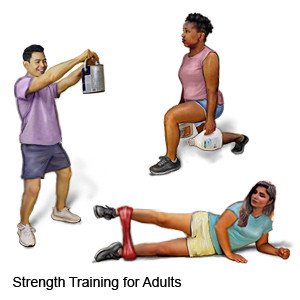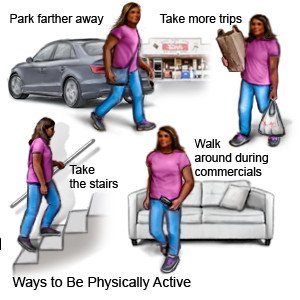Benefits of an Active Lifestyle
Medically reviewed by Drugs.com. Last updated on Aug 4, 2025.
AMBULATORY CARE:
An active lifestyle
means you do physical activity throughout the day. Any activity that gets you up and moving is part of an active lifestyle. Physical activity includes exercise such as walking or lifting weights. It also includes playing sports. Physical activity is different from other kinds of activity, such as reading a book. This kind of activity is called sedentary. A sedentary lifestyle means you sit or do not move much during the day. An active lifestyle has many benefits, such as helping you prevent or manage health conditions.
Call your doctor if:
- You notice changes in your health, such as new or worsening shortness of breath.
- You have questions or concerns about your condition or care.
Benefits of an active lifestyle:
- You may be able to do daily activities more easily. Activity helps condition your heart, lungs, and muscles. This can help you get through your daily activities without feeling tired.
- You can help control your weight. Activity helps your body use the calories you eat instead of storing them as fat. Your body continues to burn calories at a higher rate after you are active.
- Activity can increase your health. Activity helps lower your risk for cancer, heart disease, diabetes, and stroke. Activity can help you control your blood pressure and blood sugar levels, and lower your cholesterol. If you have arthritis, activity can help your joints move more easily and with less pain.
- Your bones and muscles will get stronger. This will help prevent osteoporosis and reduce your risk for falls.
- Activity can help improve your mood. Activity can reduce or prevent depression and stress. Activity can also help improve your sleep.
Risks of a sedentary lifestyle:
A sedentary lifestyle increases your risk for diseases such as diabetes, high blood pressure, and heart disease. Your immune system also becomes weaker. This means it cannot fight infections well.
How much activity you need:
Any activity is better than no activity at all. When you go from being mostly inactive to adding some activity, you will see health benefits. The following are general guidelines:
- Do aerobic activity several days each week. Aerobic activity includes walking, bicycling, dancing, swimming, and raking leaves. Aim for 150 to 300 minutes of moderate activity, or 75 to 150 of vigorous activity each week. You can also do a combination of moderate and vigorous activity.
- Do strength training at least 2 times each week. Strength training helps you keep the muscles you have and build new muscles. Strength training includes pushups, yoga, tai chi, and weightlifting. If you do not have access to weights, you can lift items around your house. Try to work all the major muscle groups, such as your legs, arms, abdomen, and chest. Do 2 or 3 sets on each area. Use a weight that is slightly heavier than you can lift easily. You can work up to heavier weights. You can also use resistance bands instead of weights.

Steps you can take to become more active:
- Set goals. Set some long-term goals and some short-term goals. For example, you may want to be able to walk for 30 minutes without becoming short of breath. Try not to put time requirements on your goals. For example, do not think you should reach your goal in a month. Set smaller goals, such as walking a little longer each week, or feeling less shortness of breath.
- Be active all day. Activity does not have to mean structured exercise each day. You can be more active by making small changes all day. For example, try parking as far from the entrance of buildings as you can when you run errands. If possible, walk or ride a bike instead of driving. Take the stairs instead of the elevator.

- Keep a record of your activity and your progress. You can do this by writing down your daily activity. Include the kind of activity and how long you did it. You can also use a program on your phone or other device that will track activity for you. Also record your progress. You may be doing daily activities more easily, sleeping better, or building muscles.
- Step counting can help you monitor activity. A general guide is to take 10,000 steps each day. A pedometer is a device you can wear to track your steps. Some phones have programs that will count and record steps. You may need to work up to 10,000 steps. Start by finding out how many steps you usually take in a day. Then try to take more steps each day than you took the day before.
Tips to help you stay on track:
- Start slowly and work up. You do not have to do 30 minutes of activity at one time. You can break the activity up and do a few minutes at a time. Remember that some physical activity is better than none. Stand up during the day, even if you cannot walk around. Your body uses more energy when you stand. You may be able to get a desk that allows you to stand while you type or make phone calls for work. Aim for a speed or intensity that is challenging but not too difficult. You should be able to speak a few words at a time but not be able to sing.
- Plan activities you enjoy. Do a variety of activities so you do not become bored and you stay challenged. Include activities that strengthen your bones. These activities are called weight-bearing exercises. Examples include tennis, jumping rope, and running. Swimming, riding a bike, and similar exercises keep weight off your bones. They will not help strengthen bones, but they will help your heart and lungs work better.
- Ask for support from the people in your life. Go for a walk after dinner with your family. Meet friends at the park. Take a break with a coworker and walk around. Find someone who likes to go to the gym at the same time you do. You may be more likely to go if you know another person is counting on you. Get involved in community events, such as cleaning a community park. Ask someone to help you stay on track. For example, you can tell the person about your daily or weekly activity.

- Treat yourself to a reward when you reach a goal. The rewards can be for activity done for a certain amount of time each day or days each week. Rewards can also be for progress you make. Have rewards that are not food, such as a new clothing item or book.
What you need to know about nutrition and activity:
Healthy foods will give you the energy you need to be active. Activity and good nutrition work together to help you reach or maintain a healthy weight. Healthy foods include fruits, vegetables, lean meats, fish, cooked beans, whole-grain breads, and low-fat dairy products. Your healthcare provider can help you create a healthy meal plan. He or she can tell you how many calories you need to stay active and still lose weight if needed.
 |
Follow up with your doctor as directed:
Write down your questions so you remember to ask them during your visits.
© Copyright Merative 2025 Information is for End User's use only and may not be sold, redistributed or otherwise used for commercial purposes.
The above information is an educational aid only. It is not intended as medical advice for individual conditions or treatments. Talk to your doctor, nurse or pharmacist before following any medical regimen to see if it is safe and effective for you.
Further information
Always consult your healthcare provider to ensure the information displayed on this page applies to your personal circumstances.
